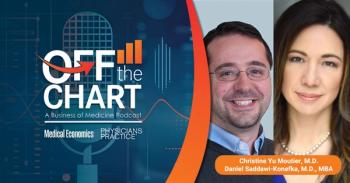
Creating Personal Space is Important for Physicians
It's necessary to create space in our personal and professional lives. It is better for us, for our patients, and for our families.
Today I received the gift of space. I had space in my schedule thanks to a couple of last minute cancellations. That led to space in my day to finish my documentation which led to space to eat lunch without simultaneously typing on the computer. In the afternoon, I had space to think through a complex patient and read through the medical chronicle of another. This space allowed me to say "thank you" to my medical assistant, congratulate a co-worker on an important milestone, share an article with a colleague, and leave on-time. I actually forgot what on-time meant as it's been as long as I can remember since I left at that hour.
Our lives are crammed full of activities and news, projects and obligations, meetings and deadlines. The electronic medical record (EHR) is bursting with information too voluminous to ever read. Medical journals appear in my mailbox – both the one at the end of my driveway and the one on my computer – so frequently that I cannot even skim the table of contents in all of them. There is no space. This is such a common part of our modern lives that it becomes an ephemeral element that is somehow no longer there and difficult to define.
Once you get some space – on vacation, because of illness, or on purpose through slowing down and tuning out, you realize what's been missing and crave more of it.
Interestingly, when I find myself in an unusually un-hectic day, I find it easier to continue that pace when I get home. I don't arrive home in a rush with a mind full of patient details and thoughts of what I need to do tomorrow. My phone doesn't hearken to me like usual. I enjoy the slower pace and spend time with my family without feeling pressure to finish up and go be productive. It gives me the ability to mentally and emotionally stretch out and breathe.
We have developed a culture in which this type of space is a luxury, when in reality it is a necessity. When I'm in patient care, I am constantly filtering thousands of details each day trying to discern the horses from the zebras, the unimportant from the life-threatening, and the urgent from the important. My adrenaline-fueled brain works great for emergent issues when I can focus all of that energy and attention like a laser-beam at the single thing in front of me.
However, in a typical day in which there are many competing urgencies instead of that one emergency, the adrenaline distracts me, causing me to jump around mentally without actually landing anywhere for enough time. I realize how important the space is when I get it back, even just briefly.
So, here's to creating that space in our personal and professional lives. It is better for us, for our patients, and for our families. Go ahead – clear some space and breathe.
Newsletter
Optimize your practice with the Physicians Practice newsletter, offering management pearls, leadership tips, and business strategies tailored for practice administrators and physicians of any specialty.








